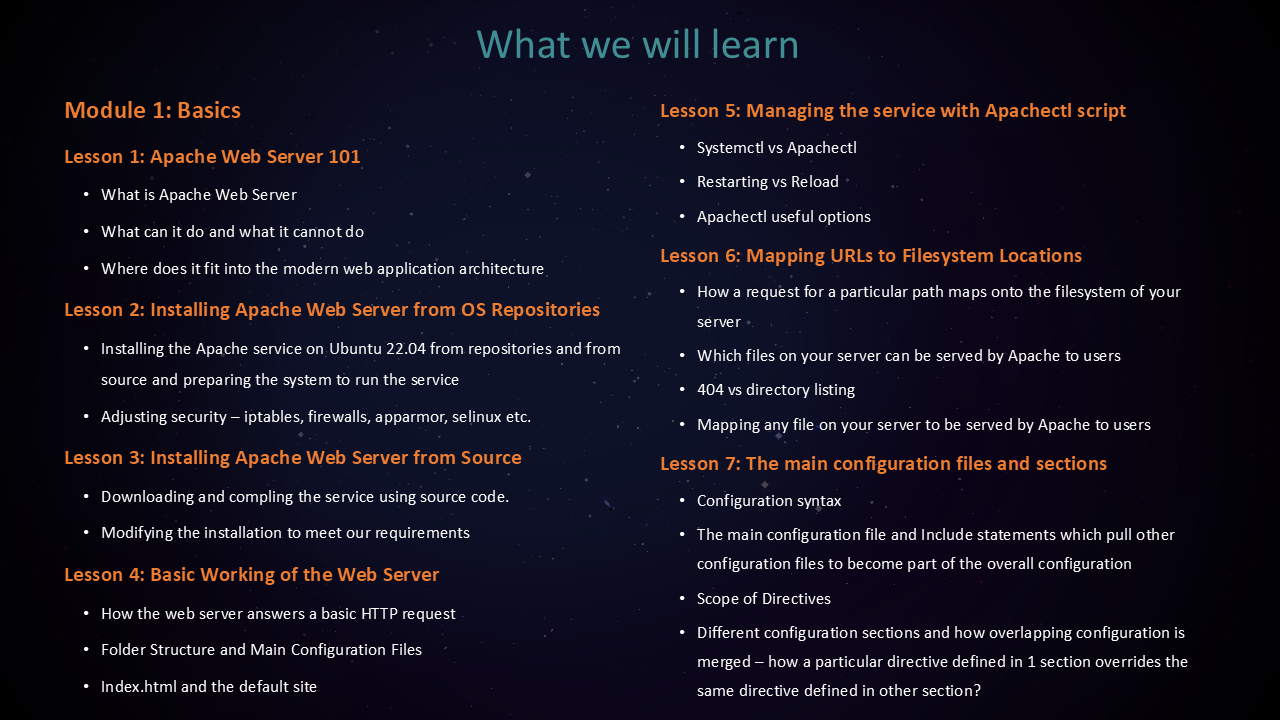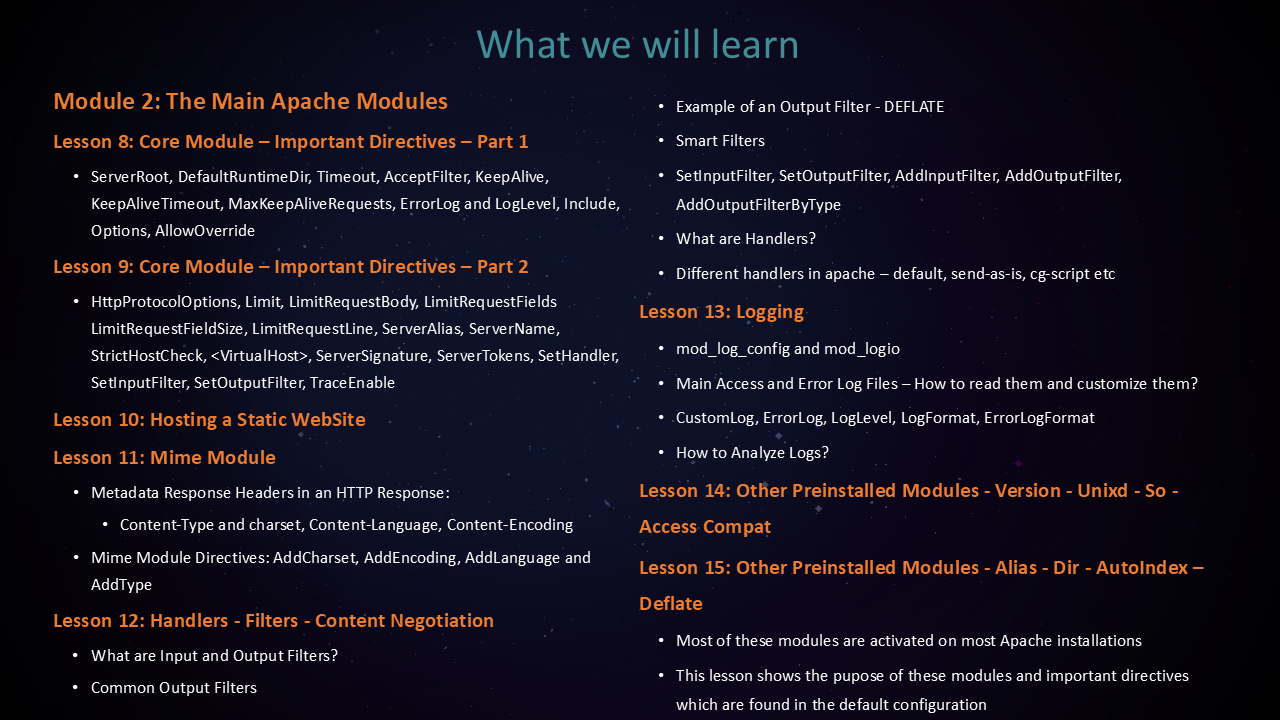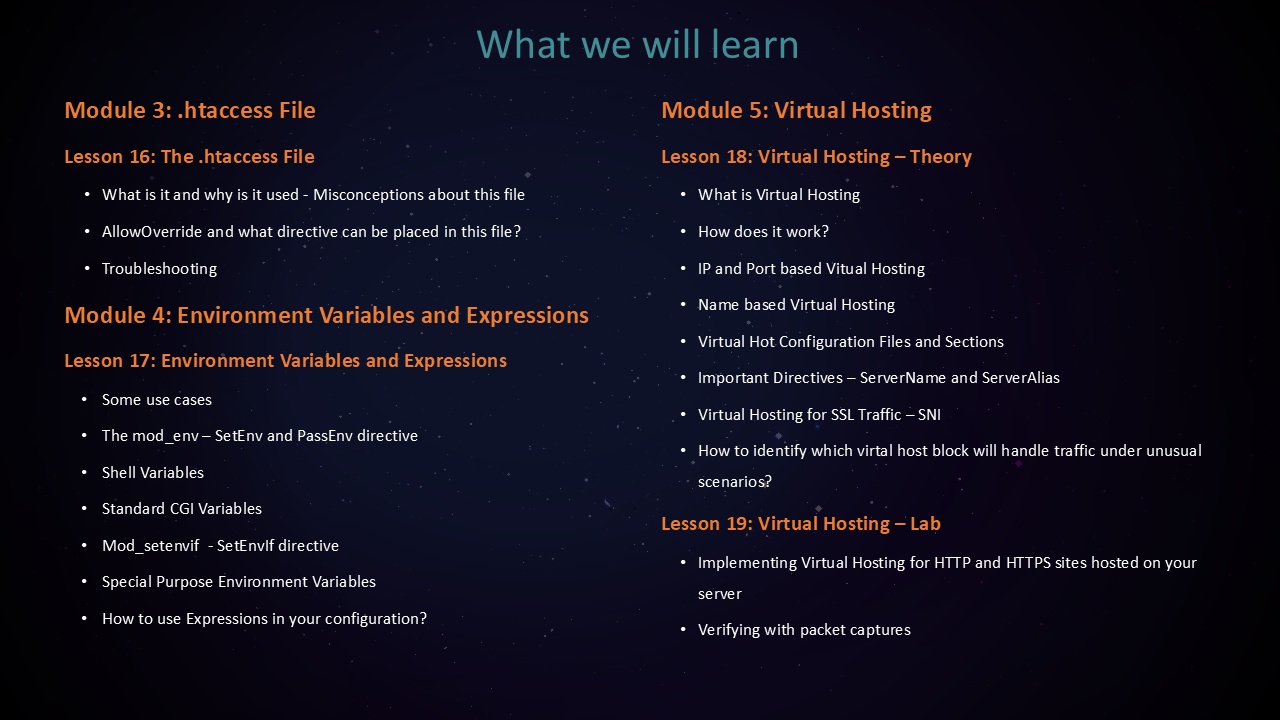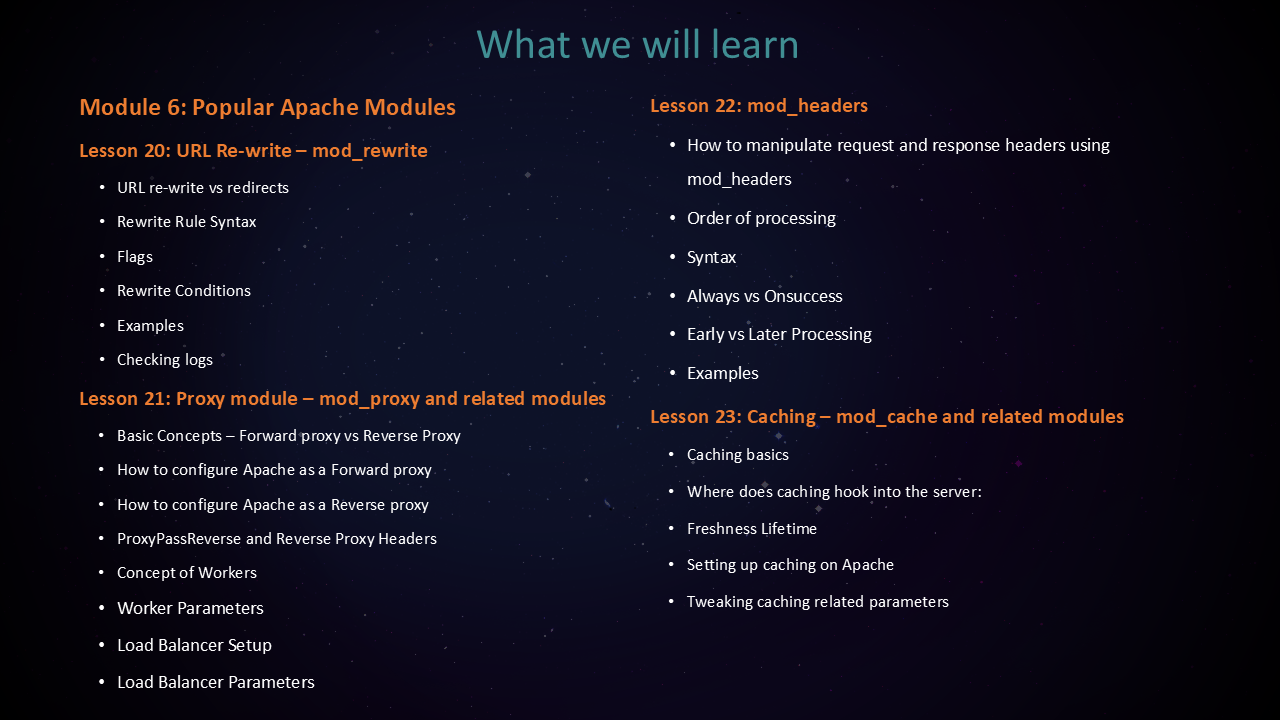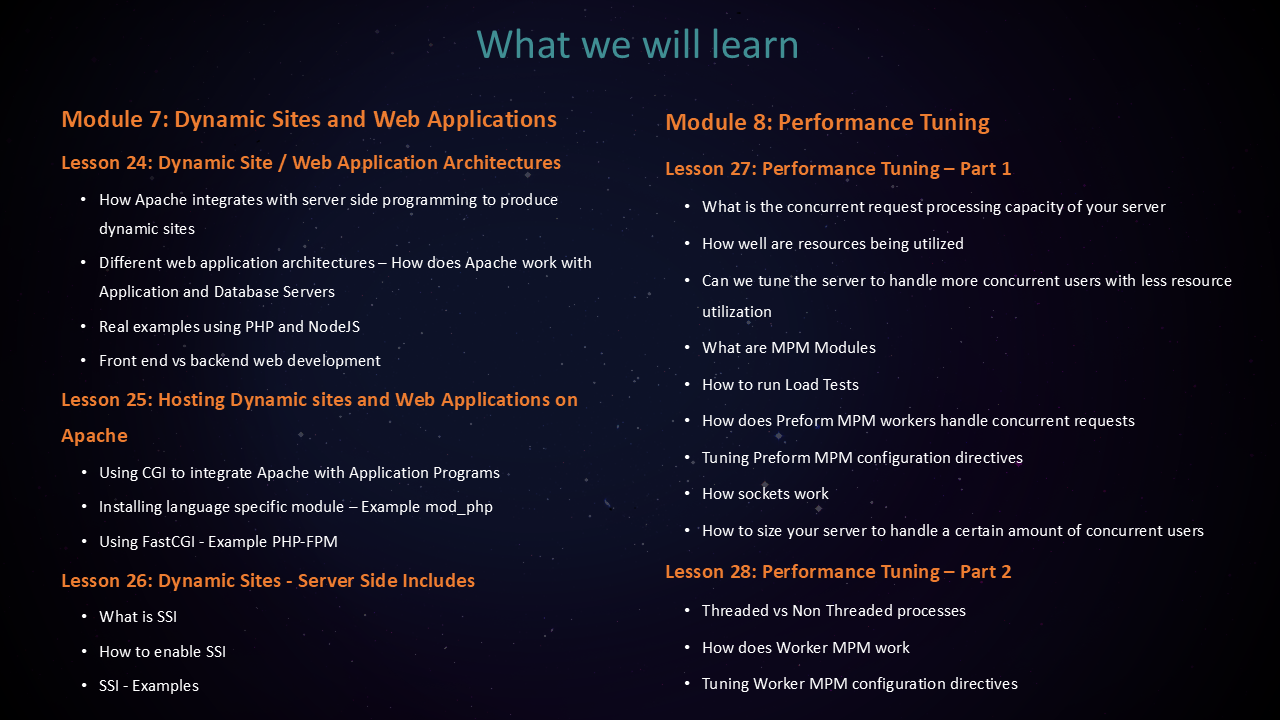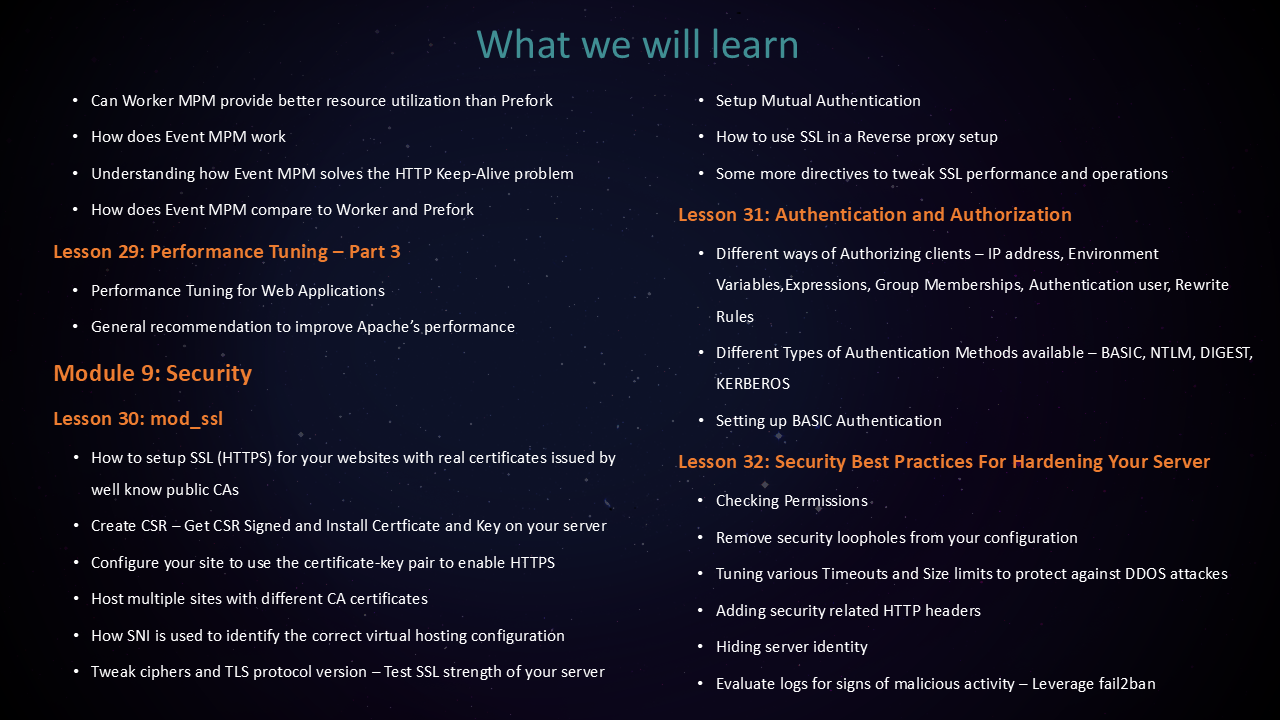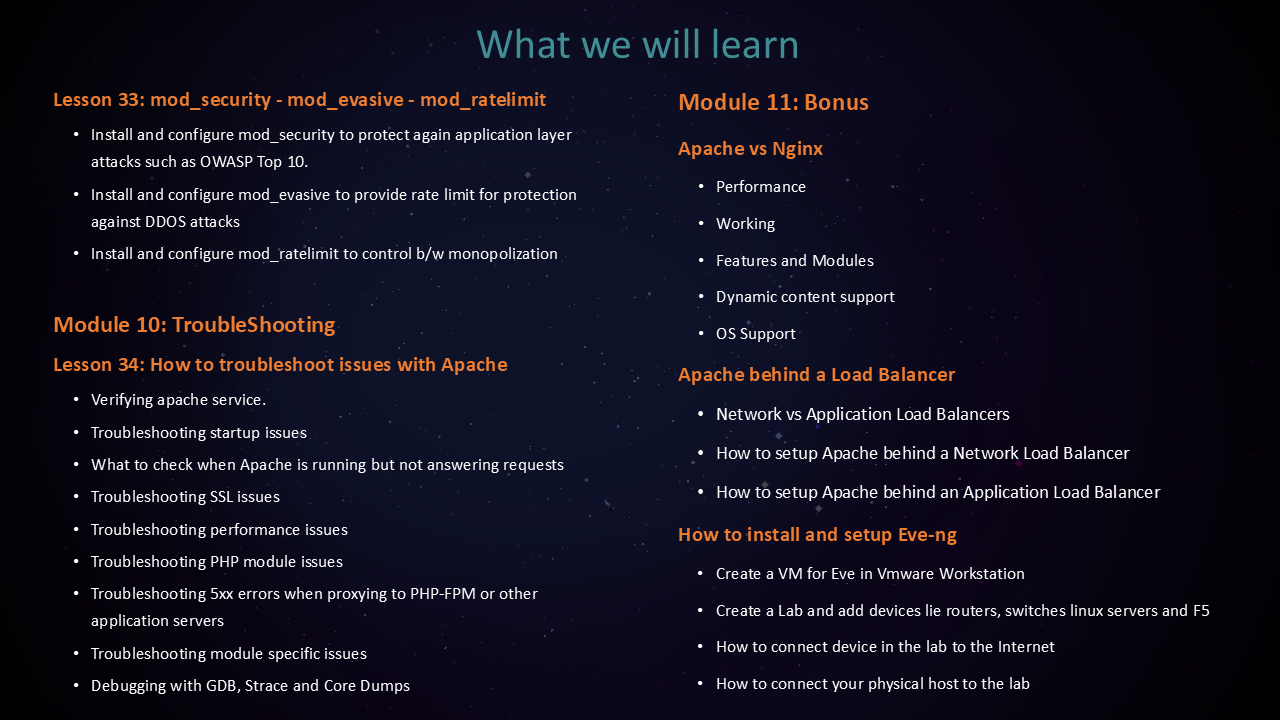This course includes:
- 14.5 hours on-demand video
- Front End and Backend Code for the Website
- Downloadable commands and configurations
- Full lifetime access
- Certificate of Completion
Who is this course for:
This course has been especially designed for Network Engineers looking forward to learn how web site hosting and web servers work.
It can also be leveraged by seasoned application support engineers, system administrators, platform engineers, web site hosting administrators, web developers and other infrastructure professionals as it covers the working of the web server in depth.
Requirements:
- Basic HTTP and TCP knowledge
- Basic Linux knowledge
- Access to a Linux server - cloud / eve-ng / gns3
- Access to intermediate network devices such as Layer 7 proxies
Course Outcomes:
- Thorough understanding of how Apache Web Server works
- Complete mastery on how to tune Apache for hosting static web sites and web applications
- Understand how to integrate Apache within a Web Application Architecture
- Be able to host Internet facing websites with appropriate performance tuning and security protections
- Confidently troubleshoot Apache issues and be able to distinguish if the issue is with Apache or OS/network/upstream application/database servers
- Troubleshoot and support Layer 7 forward (web filtering) and reverse proxies (Load Balancers/CDNS) more effectively
What sets this course apart from others:
- High quality production standards
- Respect for time - every second of the course is used to deliver precise and practical information
- Comprehensive coverage of all Apache settings
- Goes deep into complex topics such as performance tuning using real load tests and integrating Apache into a web application environment
- All topics are explained with real static/dynamic websites
- Prepares you with real world on the job troubleshooting skills
What you will learn:
- What is a Web Server
- Installing Apache from Repositories and from Source
- How a Web Server starts up and answers HTTP Requests
- Folder Structure and Main Configuration Files
- How to manage the service using Apachectl script
- How a request for a particular path maps onto the filesystem of your server
- Controlling access to any file on your server to be served by Apache to users
- Scope of directives and how different configuration sections are merged
- All important directives from the Core module
- How HTTP KeepAlive works
- How to host a static web site
- What are Handlers and Filters
- The role of MIME module and related directives
- How to setup Content Negotiation
- Other pre-installed modules such as Version, Unixd, So, Access Compat, Alias, Dir, AutoIndex, Deflate
- How to configure logging and analyze and tune logs
- The role and working of .htaccess files
- How to use Environment variables and Expressions
- Different ways to access variables in server side programs
- What is Virtual Hosting
- Different Types of Virtual Hosting - ip vs port vs name
- Setting up Vitual Hosting for HTTP and HTTPS websites
- How to use Mod Rewrite to change the path of the incoming request
- How to setup Apache as a Forward Proxy with Caching
- How to setup Apache for Reverse Proxy and Load Balancing
- How to use Mod Headers to manipulate request and response headers
- Different web application architectures – How does Apache work with Application and Database Servers
- Real examples using PHP and NodeJS
- Different ways to integrate Apache within a Web Application Architecture - CGI/Mod PHP/FastCGI-PHP-FPM
- Server Side Includes (SSI)
- Deep Dive into Performance Tuning MPM Modules - Preform, Worker and Event
- How sockets work - how a request moves from the NIC to the Apache process through the OS Kernel
- How to size your server to handle a certain amount of concurrent users
- How to setup SSL for your website
- How to tweak SSL related settings
- Understand different ways of implementing Authentication and Authorization to control access to your server
- Security Best Practices For Hardening Your Server
- Configure mod_security, mod_evasive, mod_ratelimit to provide enhanced protection to your website
- How to Troubleshoot issue with the server and to be able to distinguish from issues related to other components such as the OS, network or upstream application/database servers
- Troubleshooting 5xx errors.
- Apache vs Nginx
- How Apache Web Server behaves and how to set it up when deployed behind a Network Load Balancer
- How Apache Web Server behaves and how to set it up when deployed behind an Application Load Balancer
Course Curriculum
Detailed Course Syllabus
Your instructor

Shreevar is an experienced Network Engineer with 18 years of experience working with leading tech giants like AWS Premium Network Support.
Having worked in solutions and support in Layer 1 through Layer 7 technologies Shreevar now specializes in end to end network troubleshooting across a wide spectrum of technologies including AWS, LAN, WAN, VPNs, Routing&Switching, Load Balancing, Firewalls, Proxies, Web and DNS Servers, complex web application architectures and network automation.
He is now focussed on designing deeply technical comprehensive one stop training programs for his students enabling them to reach expert level within the shortest possible time and without having to waste time looking for content.

